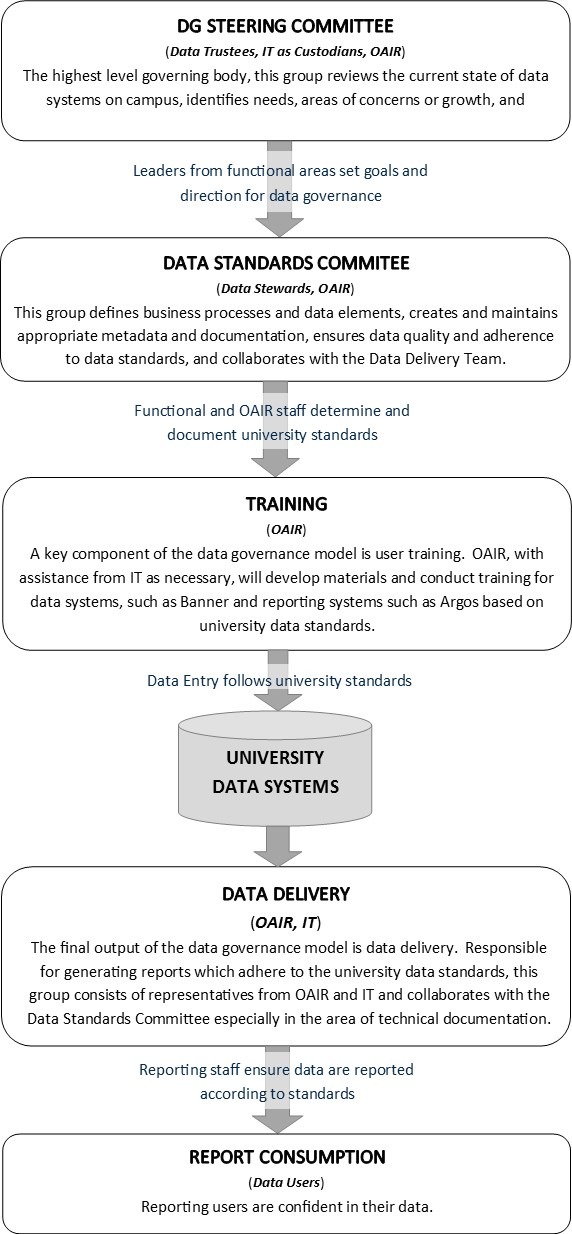Enabling Belmont's Story through Effective Data Management
Data are a university asset that enables the university to carry out its mission and strategic goals. University data are effectively leveraged through an integrated program of data management to ensure reliability, effectiveness, and security. High-quality data increases accuracy and confidence in decision-making and reduces the risk of non-compliance with governmental and other agencies such as accreditation bodies and the NCAA and increases user confidence in reports.
Belmont's Data Governance program is a collaborative effort among Institutional Research and Strategic Analytics, Library and Information Technology, and university functional areas designed to manage data resources in the most efficient and effective way and enable the development of a strong business intelligence program. Strong data governance ensures that data are created, maintained, and used in a manner that provides the best value to the institution. The scope of data governance includes data security, integrity, accuracy, business process management, data policies and documentation.
These pages define data governance at Belmont and outline the roles and responsibilities of each group as they work together as caretakers of the university's data. Institutional Research and Strategic Analytics leads the Data Governance process at Belmont and directs reporting through our university reporting tool, Argos.
Roles and Responsibilities
Data governance team members have been selected based on their expertise within functional areas and bring invaluable insight to the governance process. The following roles have been defined to ensure collaborative, cross-unit data governance at Belmont.
- Data Governance Leadership: Institutional Research and Strategic Analytics provides leadership for the data governance program at Belmont and leads training and reporting projects. The Associate Provost serves as chair of the Steering Committee and Data Standards Committee.
- Data Stewards: One or more individuals from each functional area who has knowledge of the business and data entry processes within their area.
- Data Trustees: Leadership from all functional areas of the university that create and maintain data.
- Data Custodians: Information Technology, responsible for the security and availability of data, fulfills this role.
- Data Users: Staff members who have direct responsibility for entering and using data as part of their daily tasks. Data users are expected to enter data into Belmont’s data systems according to the guidelines established by the Data Standards Committee and are supported in this process through documentation and training coordinated by the Data Standards Committee members.
Data Governance Structure
(Data Trustees, IT as Custodians, IRSA)
The highest level governing body, this group reviews the current state of data systems on campus, identifies needs, areas of concerns or growth, and leaders from functional areas set goals and direction for data governance
(Data Stewards, IRSA)
This group defines business processes and data elements, creates and maintains appropriate metadata and documentation, ensures data quality and adherence to data standards, and collaborates with the Data Delivery Team.
Functional and IRSA staff determine and document university standards
(IRSA)
A key component of the data governance model is user training. IRSA, with assistance from IT as necessary, will develop materials and conduct training for data systems, such as Banner and reporting systems such as Argos based on university data standards.
Data Entry follows university standards
University Data Systems
(IRSA, IT)
The final output of the data governance model is data delivery. Responsible for generating reports that adhere to the university data standards, this group consists of representatives from IRSA and IT and collaborates with the Data Standards Committee, especially in the area of technical documentation.
Reporting staff ensure data are reported according to standards
(Data Users)
Reporting users are confident in their data.


